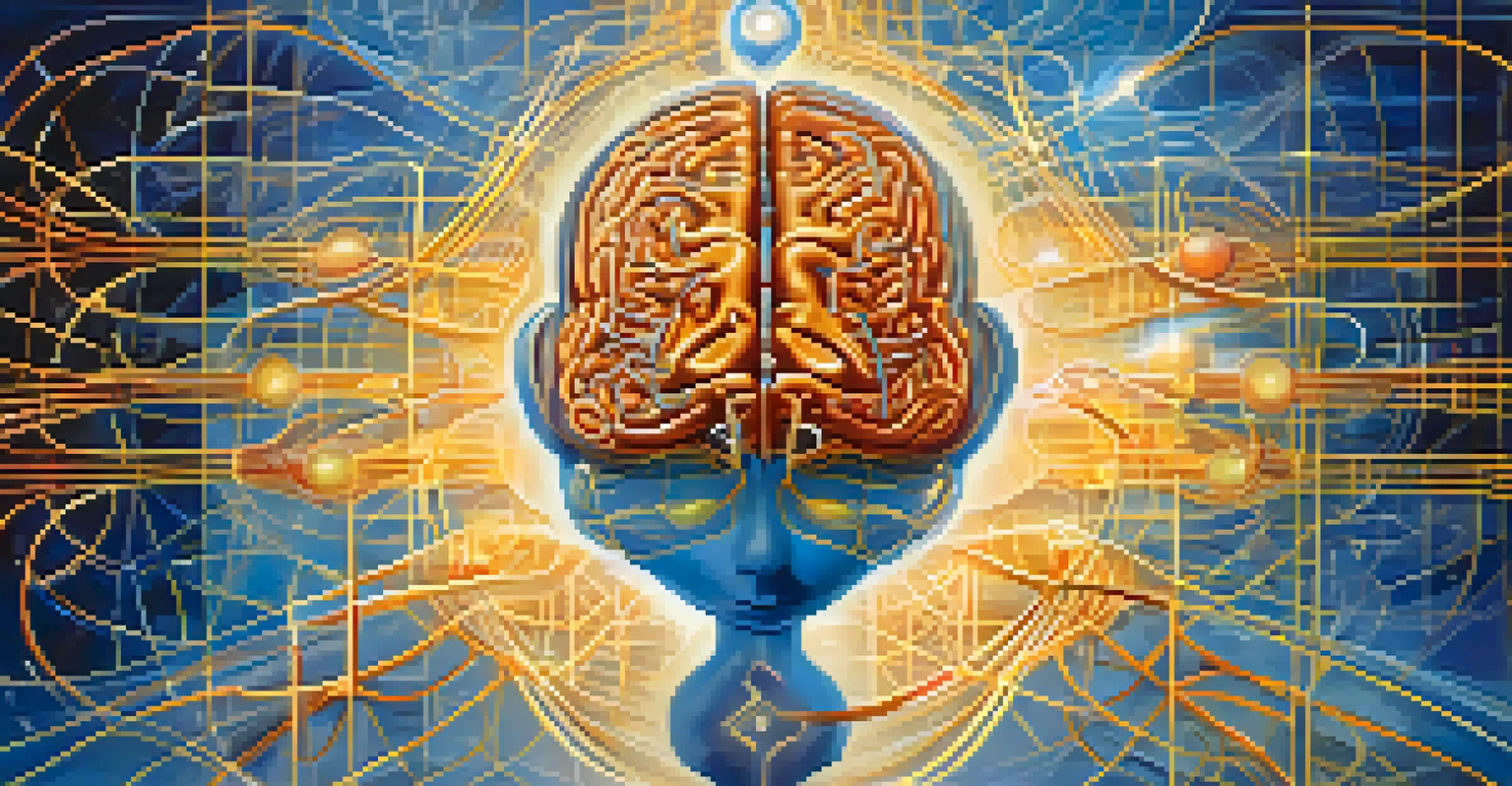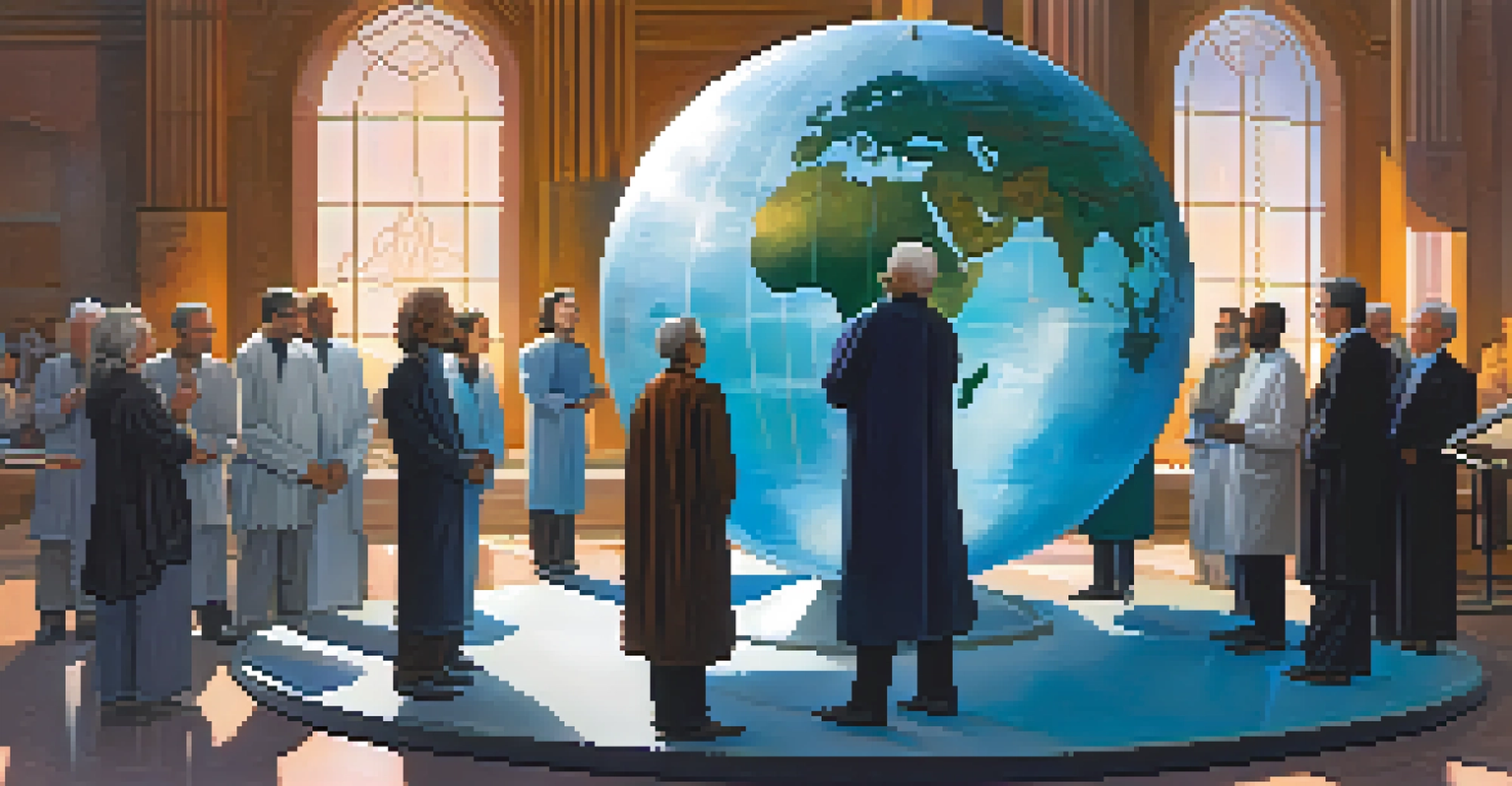The Intersection of Science and Spirituality: A Philosophical View

Defining Science and Spirituality: An Overview
Science is often seen as the pursuit of knowledge through observation and experimentation, while spirituality encompasses a broader, more subjective understanding of existence. Science relies on empirical evidence, whereas spirituality is more about personal belief and experience. This distinction is crucial as we explore how these two fields can intersect and influence one another.
Science without religion is lame, religion without science is blind.
Take, for instance, the way science examines the universe through physics and chemistry, uncovering the laws that govern our reality. In contrast, spirituality seeks answers to the 'why' of existence, often addressing questions about purpose and the human experience. By recognizing their unique approaches, we can better appreciate how they might inform each other.
Related Resource
Ultimately, this initial understanding sets the stage for a deeper exploration into how science and spirituality can coexist and even enrich one another in various aspects of life.
Historical Context: Science and Spirituality Through the Ages
Throughout history, science and spirituality have often been at odds, but they have also shared a rich tapestry of interaction. In ancient civilizations, many scientific endeavors were deeply intertwined with spiritual beliefs, such as astrology and alchemy. These proto-sciences illustrate how early thinkers sought to understand the universe through both observation and mystical interpretations.

As we moved into the Age of Enlightenment, the scientific method began to gain prominence, creating a divide between empirical inquiry and spiritual explanation. Figures like Galileo and Newton laid the groundwork for modern science, often clashing with religious institutions that upheld spiritual explanations of the cosmos. This tension has continued into modern times, but there have also been moments of synergy that are often overlooked.
Science and Spirituality Intersect
Science and spirituality, while distinct, can influence and enrich one another in understanding existence.
Understanding this historical context allows us to appreciate the complex relationship between these two fields, acknowledging both conflict and collaboration as we explore their intersection in contemporary thought.
Modern Perspectives: Bridging the Divide
In recent years, there has been a growing movement to bridge the gap between science and spirituality. Many researchers and thinkers advocate for a holistic approach that recognizes the value of both empirical evidence and subjective experience. This perspective encourages dialogue rather than division, fostering an environment where scientific inquiry and spiritual exploration can coexist.
The greatest scientist is also a great poet; he must have a sense of wonder and the capacity to dream.
For example, the field of quantum physics has sparked discussions that challenge our traditional understanding of reality, leading some to draw parallels between scientific discoveries and spiritual philosophies. Concepts like interconnectedness and the observer effect resonate with spiritual beliefs about unity and consciousness, blurring the lines between the two domains.
Related Resource
By embracing modern perspectives, we open ourselves to a wealth of insights that can enhance our understanding of both science and spirituality, encouraging a more integrated worldview.
The Role of Consciousness: A Shared Inquiry
Consciousness is a central theme in discussions about the intersection of science and spirituality. While science studies consciousness from a neurological standpoint, examining brain activity and cognitive processes, spirituality often approaches it as an exploration of the soul or higher self. This dual approach highlights how different methodologies can converge on similar questions about the nature of existence.
Take meditation, for instance. Scientific research has shown that meditation can lead to measurable changes in brain function, promoting mental well-being and enhancing focus. Simultaneously, many spiritual traditions view meditation as a pathway to greater self-awareness and connection to the universe. Here, we see a beautiful intersection where scientific findings support spiritual practices.
Historical Tensions and Synergies
Throughout history, science and spirituality have experienced both conflict and collaboration, shaping our understanding of the universe.
By exploring consciousness through both lenses, we can gain a richer understanding of what it means to be human, appreciating the complexities and nuances of our existence.
The Impact of Scientific Discoveries on Spiritual Beliefs
Scientific discoveries have historically influenced spiritual beliefs, sometimes leading to shifts in how we perceive the universe and our place within it. For example, the theory of evolution challenged traditional creationist views, prompting many to reevaluate their spiritual frameworks. This illustrates how scientific advancements can serve as catalysts for deeper philosophical reflections.
Moreover, discoveries in fields like astronomy have expanded our understanding of the cosmos, inviting spiritual interpretations of the vastness and interconnectedness of all things. The realization that we are made of stardust, for example, can evoke feelings of awe and reverence, merging scientific knowledge with spiritual insight.
Related Resource
Therefore, as we witness ongoing scientific exploration, it's essential to remain open to how these discoveries might reshape our spiritual perspectives, fostering a dynamic interplay between the two.
Spiritual Practices Influencing Scientific Inquiry
Just as science impacts spirituality, spiritual practices can also influence scientific inquiry. Techniques like mindfulness and meditation have gained traction in scientific research, particularly in psychology and neuroscience. These practices not only enhance personal well-being but also provide valuable insights into cognitive functions and emotional regulation.
For instance, researchers have found that mindfulness can improve focus and reduce stress, leading to better performance in various tasks. This empirical evidence supports the spiritual notion that being present and aware can lead to a more fulfilling life. Such findings encourage scientists to explore these practices further, potentially leading to groundbreaking discoveries.
Future of Integrated Knowledge
The future holds potential for a collaborative approach, merging scientific inquiry with spiritual insights for holistic understanding.
Ultimately, this reciprocal relationship illustrates that spiritual practices can enrich scientific exploration, enhancing our understanding of the human experience and promoting holistic well-being.
Future Possibilities: A New Paradigm of Understanding
As we look to the future, the intersection of science and spirituality presents exciting possibilities for a new paradigm of understanding. By fostering collaboration between scientists and spiritual leaders, we can cultivate a more integrated approach to knowledge that respects both empirical evidence and personal experience. This collaborative spirit holds the potential for groundbreaking advancements in various fields, from medicine to psychology.
Consider the advancements being made in holistic health, where medical professionals increasingly acknowledge the importance of mental and emotional well-being in physical health. This shift reflects a growing recognition that a person is more than just a collection of biological systems; they are individuals with unique experiences and beliefs that shape their health.

In conclusion, the future of science and spirituality lies in their ability to coexist harmoniously, inviting us to explore the depths of our existence with curiosity and openness. Together, they can offer profound insights that enrich our understanding of life.